Episodes
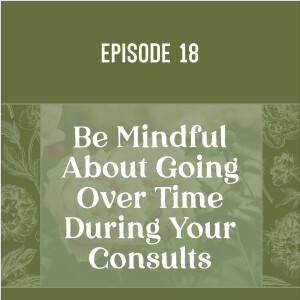
Wednesday Mar 03, 2021
Wednesday Mar 03, 2021
In this visit, I share some things to think about if you're consistently going over the scheduled amount of time for your clinical visits. These aren't always obvious, and it's important to consider how your timing affects your clients physically, emotionally, and logistically.
If you'd like to be part of a community of practice with other clinical herbalists/herbally-minded nutritionists, please consider joining us in Monday Mentoring. We'd love to have you join!
--- Send in a voice message: https://intheclinic.com
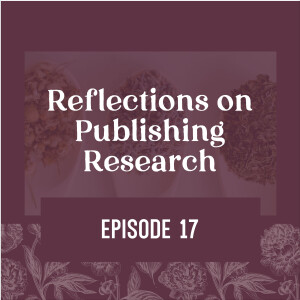
Wednesday Feb 24, 2021
Wednesday Feb 24, 2021
The trials and tribulations of survey research.
A paper that I've been working on with a team of other folks was published in the Journal of the American College of Nutrition.
It took about 2.5 years from the start of the project to publication, and it's been a wild ride.
In today's episode, I share some of what went into the research and publication process, and a few things that I learned along the way.
I hope you enjoy these reflections on what goes into a seemingly simple - and imperfect - publication & that hearing more about this process helps you to have a deeper appreciation for the studies you use in your work.
Next week, I'll be back to more clinical topics :).
Accessing the paper
Sadly, it's not open-access. I talk about this a bit in the episode. I do have 50 free e-copies to give out, so please do reach out if you'd like one of them. You can check out the abstract on PubMed.
Here's the full citation:
Cherpak-Castagna, C. E., Gafton, E. N., Nault, D., Van Lare, S. J., & Freeman, K. C. (2021). Cross-Sectional Survey of Graduate Clinical Nutrition Students Describing Dietary Choices and Recommendations. Journal of the American College of Nutrition, 1–10. Advance online publication. https://doi.org/10.1080/07315724.2020.1863282
--- Send in a voice message: https://intheclinic.com

Tuesday Feb 16, 2021
Tuesday Feb 16, 2021
It's okay to keep things simple.
Sometimes practitioners feel pressured to come up with complicated recommendations.
A complicated case means someone needs a complex protocol, right?
Not always.
Sometimes, simple is just the thing.
In this episode, I gently remind you of the reasons it's okay - and even preferable - to stick with basic, easy (in some ways) recommendations.
These are more affordable. They're easier to follow. They're more likely to stick, to make a difference in the long run.
Try simple before you get fancy.
I hope this is a helpful reminder.
xo,
Camille
Getting Support
If you're feeling a bit bogged down with a complicated case (or many cases!), I highly recommend getting an outside perspective to help. Here are few options to consider:
Private Mentoring: one-on-one support for help with complicated cases and/or building your practice
Monday Mentoring: a community of practice for herbalists + herbally-minded nutritionists
List of AHG mentors
--- Send in a voice message: https://intheclinic.com

Tuesday Feb 09, 2021
Tuesday Feb 09, 2021
The more clear you are about who you're aiming to serve, the easier things will be in your clinical work.
Feeling confused about your target market and niche?
Not even sure what the difference is between the two?
Don't think you really need either of these?
Listen to this episode to find out why it's so helpful to narrow these things down for yourself and to learn why it's okay - really! - if you're not quite there yet.
Special Prize 🎁
If you've stumbled across this, congratulations! You can access my "finding your practice focus" webinar entirely for free right here. No email address/sign in needed. This isn't available elsewhere for purchase or for free. Enjoy. Hope you find it helful.
--- Send in a voice message: https://intheclinic.com
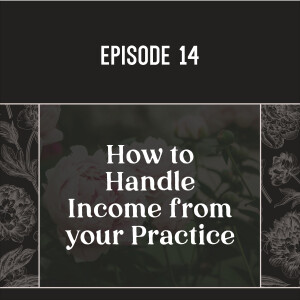
Monday Feb 01, 2021
Monday Feb 01, 2021
Profit First: The book I didn't want to like.
Based on the title alone, this didn't seem like something I'd be interested in.
It's been recommended by so many people, though, and I'm feeling increasingly lost when it comes to business finances so I thought I'd check it out.
And yep. "People" were right. It was super helpful.
I've detailed the most important thing I learned from the book in this episode.
Although this seems like very basic information, it helped things click into place for me. I hope it's helpful for you, too.
You might be wondering if you really need to read this if you're just getting started with your practice.
YES. Please do.
Having this mindset/system set up in advance will help you! (In the first few months, you may be spending quite a bit more than you're bringing in as you get things set up. Once you're out of this phase, you can start implementing this system.)
I'd love to know what you think!
Resources
Profit First book
You Need a Budget Software (aka YNAB)
Here's a simple explanation of Profit First from Wave
--- Send in a voice message: https://intheclinic.com
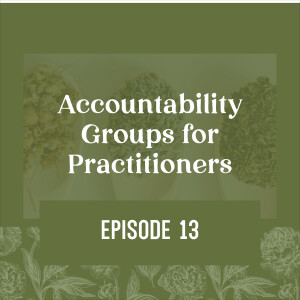
Sunday Dec 13, 2020
Sunday Dec 13, 2020
Being in private practice can be isolating.
If you're a clinician in a private practice, you may feel like very few people understand what you do and the challenges that come along with the work.
It's easy to get distracted or to spend hours running around in circles trying to fix a small thing.
This is why I recommend joining an accountability group ASAP
An accountability group is simply a small group of people who meet regularly to check in and provide support for one another.
This doesn't have to take a long time. It's entirely free to form one yourself.
Just 10-15 minutes per person can be enough to make all the difference in your work.
In accountability groups, you're not talking about cases.
Instead, you're focusing on what you need to do to grow/build/run your practice more smoothly.
Joining an accountability group (sometimes called a mastermind group) and committing to showing up for yourself and for the others in your group once weekly is probably the single most helpful thing you can do if your intention is to build and grown your practice this year.
It sounds simple, but over time it makes all the difference to state your intentions out loud and to hear yourself saying what you worked on over the past week and what you'd like to work on in the upcoming week.
You'll get feedback and reflections from others in the group, and you'll hear what is and is not working for others as well.
Getting Support
In this episode, I discuss how to form an accountability group, what you should talk about if you do join one, and how to make sure the time is well-spent.
If you're interested in even more support and accountability, check out my Monday Mentoring program. When you join, you'll attend our regular weekly meetings AND have the option to join an accountability group with other practitioners.
--- Send in a voice message: https://intheclinic.com
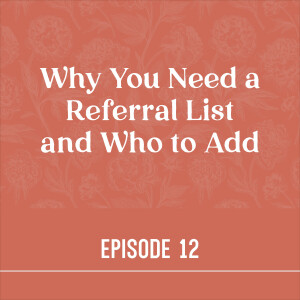
Wednesday Nov 04, 2020
Wednesday Nov 04, 2020
Do you have a referral list?
It's one of those things that's easy to put off, particularly when you're just getting started with your practice.
Over time, you might get busy and never quite get around to starting one.
Or, perhaps you have a jumble of business cards from conferences or networking events bopping around in the bottom of your bag.
If you don't have a referral list, I highly recommend starting one now.
Why?
It makes it easier to remember who's out there to help your clients.
You'll have their contact information and any key notes right at your fingertips, when you need it.
Before I had my referral list, whenever I needed to send someone to another herbalist my mind would freeze and I could only ever remember the same two or three people, even though I know dozens and dozens of amazing practitioners.
If you keep an easily-accessible list of practitioners you'd comfortably recommend, things will be much easier
Have a listen to the episode above to get some tips about who to add and how to organize things.
A Referral List Template
Not everyone prefers an electronic list, but I find that keeping my referral list on my computer helps me to find/access it more easily.
To make things easier for you, you can access a referral list template below. (No email address required!)
It's a Google doc, and you'll need to copy it into your own Google Drive to access & edit it.
Copy my Referral List Template
I hope that's helpful for you.
Take care,
Camille
--- Send in a voice message: https://intheclinic.com
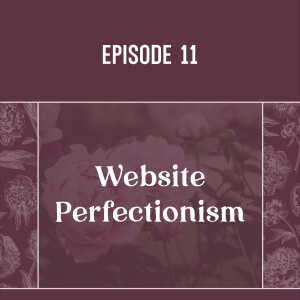
Thursday Oct 22, 2020
Thursday Oct 22, 2020
Are you guilty of website perfectionism?
I am.
If I had my way, I could easily spend 10 or 20 hours a week tweaking things on my website.
But I'm not really helping anyone when I spend that kind of time working on aesthetics.
Here's the problem: focusing all of your attention on your website prevents you from doing the harder work of finding clients.
Too often website perfectionism gets in the way of actually starting your practice.
Do any of these sound familiar?
"I can't really promote myself until my website is done."
"I'll wait to *really* start once I like how my website looks."
"I couldn't possibly [give a talk/write an article/ask for referrals] until my website is more professional."
These are all forms of procrastination.
Don't get stuck!
Is it important to have a website? Sure. (Although I do know several practitioners who only work via word of mouth/email and it works for them!)
Do you want it to look professional? Of course.
But it's not the end of the world if it's not perfect.
In fact, I can almost guarantee that it will never be perfect. I've had a website for close to 20 years, and it is never EVER done.
In this In the Clinic episode, I share why I recommend limiting the amount of work you're doing on your website every week (hint: aim for good enough rather than perfection).
I'll tell you what I think is the bare minimum, and how to give yourself parameters so that you're not using your website to avoid other types of marketing and promotion.
Let me know what you think & if you have any tricks that you use to avoid this.
Feeling stuck? Need extra eyes on your website?
Join us in Monday Mentoring or sign up for Voxer Coaching
--- Send in a voice message: https://www.intheclinic.com

Saturday Oct 03, 2020
Saturday Oct 03, 2020
Are probiotics safe to use in infants?
I'm so glad you're asking this question.
Before recommending any supplement, we should always be asking whether it's likely to be safe and effective.
This is even more important when using supplements with infants, where the stakes are higher than in many other life stages.
The short answer is that the safety profile of probiotics in infants is quite strong in many cases.
I don't recommend probiotics for all infants, but in some cases I believe that the benefits are likely to outweigh the risks.
These cases include preterm babies at risk of necrotizing enterocolitis, infants with colic, infants who are experiencing infrequent stools, and when antibiotics have been administered. There is some evidence suggesting that probiotic administration may be helpful in preventing atopic conditions (eczema/atopic dermatitis, asthma, etc).
Please remember that probiotic activity is species- and strain-specific. Review the studies relevant to your particular case, and be sure to select a high-quality brand from a trusted source.
Listen to the full episode above for more thoughts on this topic.
References
AlFaleh, K., & Anabrees, J. (2014). Probiotics for prevention of necrotizing enterocolitis in preterm infants. The Cochrane Database of Systematic Reviews, 4, CD005496. https://doi.org/10.1002/14651858.CD005496.pub4
Guo, Q., Goldenberg, J. Z., Humphrey, C., El Dib, R., & Johnston, B. C. (2019). Probiotics for the prevention of pediatric antibiotic-associated diarrhea. The Cochrane Database of Systematic Reviews, 4, CD004827. https://doi.org/10.1002/14651858.CD004827.pub5
Karkhaneh, M., Fraser, L., Jou, H., & Vohra, S. (2020). Effectiveness of probiotics in infantile colic: A rapid review. Paediatrics & Child Health, 25(3), 149–159. https://doi.org/10.1093/pch/pxz007
Korpela, K., Salonen, A., Vepsäläinen, O., Suomalainen, M., Kolmeder, C., Varjosalo, M., Miettinen, S., Kukkonen, K., Savilahti, E., Kuitunen, M., & de Vos, W. M. (2018). Probiotic supplementation restores normal microbiota composition and function in antibiotic-treated and in caesarean-born infants. Microbiome, 6(1), 182. https://doi.org/10.1186/s40168-018-0567-4
Lerner, A., Shoenfeld, Y., & Matthias, T. (2019). Probiotics: If It Does Not Help It Does Not Do Any Harm. Really? Microorganisms, 7(4). https://doi.org/10.3390/microorganisms7040104
Ong, T. G., Gordon, M., Banks, S. S., Thomas, M. R., & Akobeng, A. K. (2019). Probiotics to prevent infantile colic. The Cochrane Database of Systematic Reviews, 3, CD012473. https://doi.org/10.1002/14651858.CD012473.pub2
Pärtty, A., Lehtonen, L., Kalliomäki, M., Salminen, S., & Isolauri, E. (2015). Probiotic Lactobacillus rhamnosus GG therapy and microbiological programming in infantile colic: A randomized, controlled trial. Pediatric Research, 78(4), 470–475. https://doi.org/10.1038/pr.2015.127
Quin, C., Estaki, M., Vollman, D. M., Barnett, J. A., Gill, S. K., & Gibson, D. L. (2018). Probiotic supplementation and associated infant gut microbiome and health: A cautionary retrospective clinical comparison. Scientific Reports, 8(1), 8283. https://doi.org/10.1038/s41598-018-26423-3
Sansotta, N., Peroni, D. G., Romano, S., Rugiano, A., Vuilleumier, P., Baviera, G., & Italian Society of Pediatric Allergy, Immunology (SIAIP), Microbiota Committee, Italy. (2019). The good bugs: The use of probiotics in pediatrics. Current Opinion in Pediatrics, 31(5), 661–669. https://doi.org/10.1097/MOP.0000000000000808
Smilowitz, J. T., Moya, J., Breck, M. A., Cook, C., Fineberg, A., Angkustsiri, K., & Underwood, M. A. (2017). Safety and tolerability of Bifidobacterium longum subspecies infantis EVC001 supplementation in healthy term breastfed infants: A phase I clinical trial. BMC Pediatrics, 17(1), 133. https://doi.org/10.1186/s12887-017-0886-9
Wickens, K., Barthow, C., Mitchell, E. A., Kang, J., van Zyl, N., Purdie, G., Stanley, T., Fitzharris, P., Murphy, R., & Crane, J. (2018). Effects of Lactobacillus rhamnosus HN001 in early life on the cumulative prevalence of allergic disease to 11 years. Pediatric Allergy and Immunology: Official Publication of the European Society of Pediatric Allergy and Immunology, 29(8), 808–814. https://doi.org/10.1111/pai.12982
Wong, C. B., Iwabuchi, N., & Xiao, J.-Z. (2019). Exploring the Science behind Bifidobacterium breve M-16V in Infant Health. Nutrients, 11(8). https://doi.org/10.3390/nu11081724
--- Send in a voice message: https://www.intheclinic.com

Sunday Sep 27, 2020
Sunday Sep 27, 2020
Working from home while homeschooling your kids?
Me, too.
Y'all, it isn't easy. In fact, it isn't easy under normal circumstances. Right now we're talking about a whole new level of "not easy."
In this episode I share a few tips that may be helpful.
Resources
Don't forget, you don't have to do this alone! Here are a few resources:
Check your library for the Libby app (audio books) Mystery Doug - free short science videos; also see Mystery Science for full lessons
The Brave Learner - great homeschool book for parents/guardians
Math Mammoth is the math curriculum we use (1st-8th)
Build Your Library is an affordable curriculum based on reading aloud for K-12. We do some but not all of this with my oldest.
Blossom and Root is a naturey curriculum. 2nd grade incorporates botany and lots of herbal medicine projects.
Podcasts my kids enjoy include Six Minutes/Remy's Life Interrupted; Finn Caspian; Wow in the World, Short & Curly; David Walliams' Marvellous Musical Podcast; Grimm, Grimmer, Grimmest; Eleonor Amplified; Homeschool History; The Past & The Curious; Treasure Island 2020; Story Pirates; Goodnight Stories for Rebel Girls; and Smash, Boom, Best.
Curiosity Stream has a nice collection of documentaries.
Outschool is a great place to outsource things you can't/don't want to/don't have time to teach. Or to sign the kids up for something to keep them busy. Referral link will get you a $20 credit.
--- Send in a voice message: https://www.intheclinic.com







